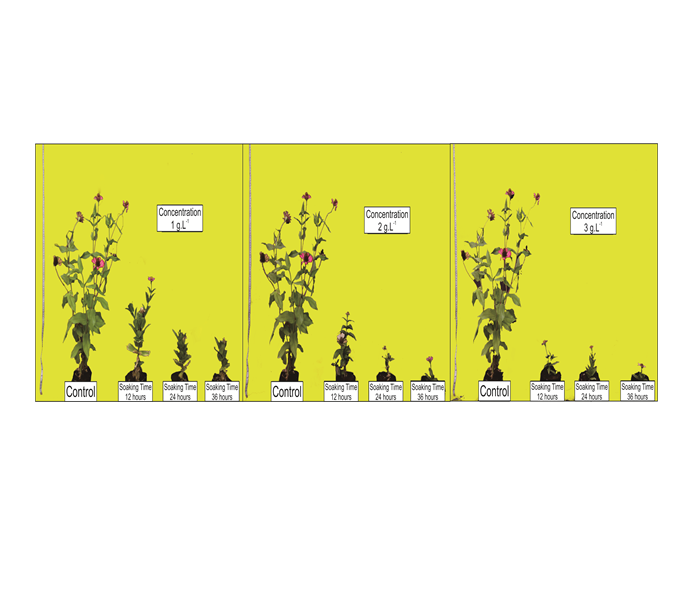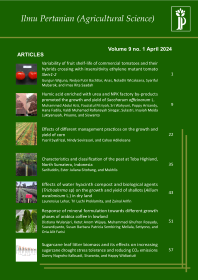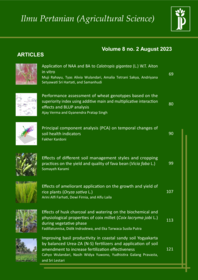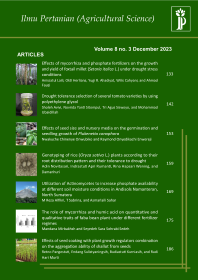
Transformation of Zinnia elegans Jacq. as an ornamental potted plant by daminozide application
Nurul Annisa(1), Aziz Purwantoro(2), Dyah Weny Respatie(3*)
(1) Department of Agronomy, Faculty of Agriculture, Universitas Gadjah Mada Jln. Flora no. 1, Bulaksumur, Sleman, Yogyakarta 55281, Indonesia
(2) Department of Agronomy, Faculty of Agriculture, Universitas Gadjah Mada Jln. Flora no. 1, Bulaksumur, Sleman, Yogyakarta 55281, Indonesia
(3) Department of Agronomy, Faculty of Agriculture, Universitas Gadjah Mada Jln. Flora no. 1, Bulaksumur, Sleman, Yogyakarta 55281, Indonesia
(*) Corresponding Author
Abstract
Zinnia elegans Jacq. is one of the ornamental plants potential to be used as a potted ornamental plants. The problem to be resolved is the size of the plant can reach 1 m, so it is necessary to modify the plant height into 20 cm to 25 cm using retardant (plant growth regulator), called daminozide. The purpose of this study was to determine the best concentration and soaking time using daminozide to inhibit the growth of zinnia. The research was conducted at Mangkuyudan 57, Yogyakarta. This research was arranged in a factorial design with 3 blocks as replication. Different concentrations of daminozide were used as first factor with three levels (1 g.L-1, 2 g.L-1, and 3 g.L-1) and soaking times were used as the second factor (12 h, 24 h, and 36 h). The data were analyzed using analysis of variance and continued with HSD-Tukey at the α = 5 %. The results showed that there were an interaction between daminozide concentration and soaking time in the height of Z. elegans. There were also positive correlation between plant height, number of flower, and flowering period. The best combination of daminozide concentration and soaking times were 2 g.L-1 and 12 h. This treatment gave the best height that fit to the criteria of a potted plant which was 20.08 cm. However, it reduced flower’s diameter, number of flowers, and canopy’s size.
Keywords
Full Text:
PDFReferences
Anonymous. (2008). Zinnia (medium height cultivars). [online] Available at: http://www.gardening.cornell.edu/homegardening/scene7e05.html [Accessed 22 December 2020].
Blazquez, M.A., Green, R., Nilsson, O., Sussman, R., and Weigel, D. (1998). Gibberellins promote flowering of Arabidopsis by activating the leafy promoter. Plant Cell, 10(5), pp. 791-800.
Burlec, A.F., Pecio, L., Mircea, C., Cioanca, O., Corciova, A., Nicolescu, A., Oleszek, W., and Hancianu, M. (2019). Chemical profile and antioxidant activity of Zinnia elegans Jacq. fractions. Molecules, 24(16), pp. 1-16.
Carvalho-Zanao, M.P., Grossi, J.A.S., Junior, L.A.Z., Ventrella, M.C., and Pereira, N. (2017). Production and leaf plasticity of rose plants sprayed with paclobutrazol and daminozide. Ciências Agrárias, 38(6), pp. 3481-3490.
Carvalho-Zanao, M.P., Junior, L.A.Z., Grossi, J.A.S., and Pereira, N. (2018). Potted rose cultivars with paclobutrazol drench applications. Ciência Rural Santa Maria, 48(8), pp. 1-7.
Herdiani, E. (2017). Budidaya bunga krisan pot. [online] Available at: http://www.bbpp-lembang.info/index.php/arsip/artikel/artikel-pertanian/1099-budidaya-bunga-krisan-pot [Accessed 6 November 2020].
Jain, R., Janakiram, T., and Kumawat, G.L. (2016). Effect of growth retardants on growth and flowering of bougainvillea (Bougainvillea spectabilis) cv. Shubra. Indian Journal of Agricultural Sciences, 86(9), pp. 1145-1150.
Khan, Z., Santpere, G., and Traveset, A. (2012). Breeding system and ecological traits of the critically endangered endemic plant Limonium barceloi (gil and llorens) (Plumbaginaceae). Plant Systematics and Evolution, 298(6), pp. 1101-1110.
Kurnia, T. I. D. (2015). Pengaruh konsentrasi daminozide pada pertumbuhan dan hasil lima varietas tanaman krisan pot. Thesis. Universitas Jember, Jember.
Megersa, H.G., Lemma, D.T., and Banjawu, D. (2018). Effects of plant growth retardants and pot sizes on the height of potting ornamental plants: a short review. Journal of Horticulture, 5(1), pp. 1-5.
Menhennet, R. (1979). Use of glass house crops. In: D. R. Clifford, and Lenton, J.R., eds., Recent Development in the Use of Plant Growth Retardants. London: British Plant Growth Regulator Group, pp.27-28.
Mukaka, M. M. (2012). A guide to appropriate use of correlation coefficient in medical research. Malawi Medical Journal, 24(3), pp.69-71.
Nazarudin, A. (2012). Plant growth retardants effect on growth and flowering of potted Hibiscus rosa-sinensis L. Journal Tropical Plant Physiology, 4(2012), pp. 29-40.
Nugroho, E. D. S. and Elonard, A. (2019). Optimalisasi mutu krisan pot dengan benih varietas krisan potong menggunakan zat pengatur tumbuh paclobutrazol dan daminozide. Jurnal Agroekotek, 11(2), pp. 122-130.
Pallavi, B., Nivas, K., D’Souza, L., Ganapathi, T.R., and Hegde, S. (2016). Gamma rays induced variations in seed germination, growth and phenotypic characteristics of Zinnia elegans var. Dreamland. Advances in Horticultural Science, 31(4), pp. 267-273.
Pasian, C. C., and Bennet, M.A. (2001). Paclobutrazol soaked marigold, geranium, and tomato seeds produce short seedlings. HortScience, 36(4), pp. 721-723
Pinto, A. C. R., Rodrigues, T.J.D., Leite, I.C., and Barbosa, J.C. (2005). Growth retardants on development and ornamental quality of potted ‘Lilliput’ Zinnia elegans Jacq. Scientia Agricola, 62(4), pp. 337-345.
Pobudkiewicz, A. (2008). The influence of growth retardants and cytokinins on flowering of ornamental plants. Acta Agrobotanica, 61(1), pp. 137-141.
Rajiv, G., Jawaharlal, M., Subramanian, S., Sudhakar, D., and Uma, D. (2018). Effect of plant growth retardants on the growth and flowering of nerium (Nerium oleander L.) Cv. Red. Chemical Science Review and Letters, 7(28), pp. 875-879.
Rezazadeh, A., Harkess, R.L., and Bi, G. (2016). Effect of plant growth regulators on growth and flowering of potted red firespike. HortTechnology, 26(1), pp. 6-11.
Salacha, P. and Zawadzińska, A. (2017). Effect of daminozide and flurprimidol on growth, flowering and bulb yield of Eucomis autumnalis (Mill.) Chitt. Folia Hort, 29(1), pp. 33-38.
Saputra, T. D. (2019). Aplikasi daminozide dalam upaya pembentukan tanaman hias pot kenikir (Cosmos sulphureus Cav.). Thesis. Universitas Gadjah Mada, Sleman.
Sardoei, A.S, Fahraji, S.S., and Ghasemi, H. (2014). Effects of different growing media on growth and flowering of zinnia (Zinnia elegans). International journal of Advanced Biological and Biomedical Research, 2(6), pp. 1894-1899.
Sharaf-Eldien, M. N., El-Bably, S.Z., and Magouz, M.R. (2017). Effect of pinching and spraying of paclobutrazol on vegetative growth, flowering and chemical composition of Zinnia elegans Jacq. Journal Plant Production, 8(5), pp. 587-592.
Shin, W. G., Hwang, S.J., Sivanesan, I., and Jeong, B.R. (2009). Height suppression of tomato plug seedlings by an environment friendly seed treatment of plant growth retardants, African Journal of Biotechnology, 8(17), pp. 4100-4107.
Sitawati, and Ni'mah, A.N. (2018). Improvement in quality of chrysant pot (Chrysanthemum sp.) with daminozide and disbudding application. Bioscience Research, 15(1), pp. 491-497.
Widyawati, N. (2019). Penampilan tanaman krisan pot (Dendranthema grandiflora) akibat retardan dan pemangkasan pucuk. Jurnal Hortikultura Indonesia, 10(2), pp. 128-134.
Article Metrics
Refbacks
- There are currently no refbacks.
Ilmu Pertanian (Agricultural Science) ISSN 0126-4214 (print), ISSN 2527-7162 (online) is published by Faculty of Agriculture Universitas Gadjah Mada collaboration with Perhimpunan Sarjana Pertanian Indonesia (PISPI) and licensed under a Creative Commons Attribution-ShareAlike 4.0 International License.













